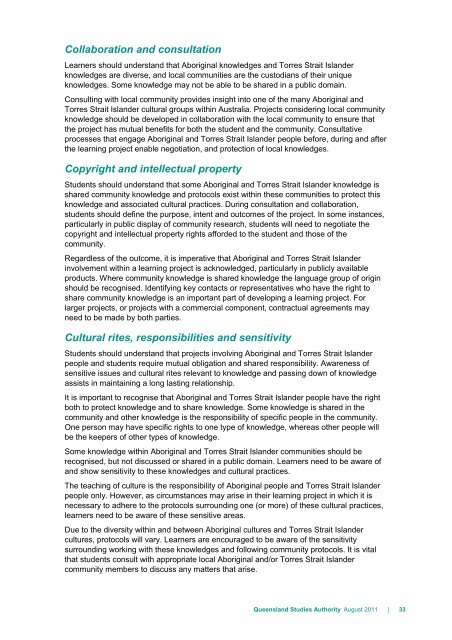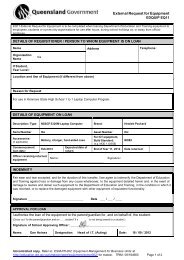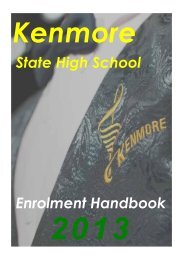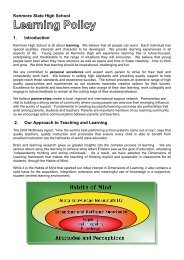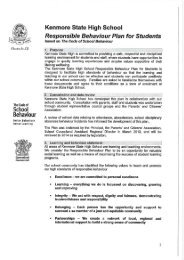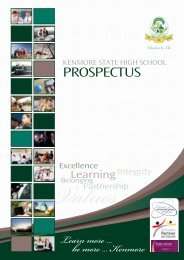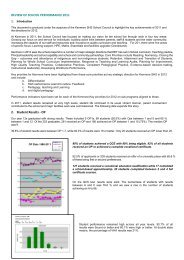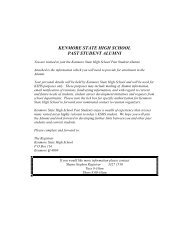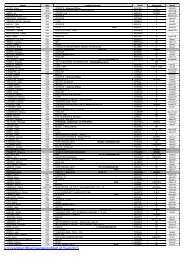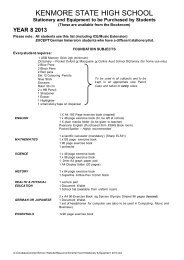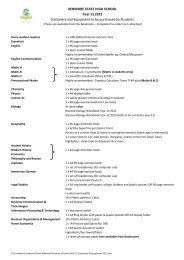QCE Handbook - Queensland Studies Authority
QCE Handbook - Queensland Studies Authority
QCE Handbook - Queensland Studies Authority
You also want an ePaper? Increase the reach of your titles
YUMPU automatically turns print PDFs into web optimized ePapers that Google loves.
Collaboration and consultation<br />
Learners should understand that Aboriginal knowledges and Torres Strait Islander<br />
knowledges are diverse, and local communities are the custodians of their unique<br />
knowledges. Some knowledge may not be able to be shared in a public domain.<br />
Consulting with local community provides insight into one of the many Aboriginal and<br />
Torres Strait Islander cultural groups within Australia. Projects considering local community<br />
knowledge should be developed in collaboration with the local community to ensure that<br />
the project has mutual benefits for both the student and the community. Consultative<br />
processes that engage Aboriginal and Torres Strait Islander people before, during and after<br />
the learning project enable negotiation, and protection of local knowledges.<br />
Copyright and intellectual property<br />
Students should understand that some Aboriginal and Torres Strait Islander knowledge is<br />
shared community knowledge and protocols exist within these communities to protect this<br />
knowledge and associated cultural practices. During consultation and collaboration,<br />
students should define the purpose, intent and outcomes of the project. In some instances,<br />
particularly in public display of community research, students will need to negotiate the<br />
copyright and intellectual property rights afforded to the student and those of the<br />
community.<br />
Regardless of the outcome, it is imperative that Aboriginal and Torres Strait Islander<br />
involvement within a learning project is acknowledged, particularly in publicly available<br />
products. Where community knowledge is shared knowledge the language group of origin<br />
should be recognised. Identifying key contacts or representatives who have the right to<br />
share community knowledge is an important part of developing a learning project. For<br />
larger projects, or projects with a commercial component, contractual agreements may<br />
need to be made by both parties.<br />
Cultural rites, responsibilities and sensitivity<br />
Students should understand that projects involving Aboriginal and Torres Strait Islander<br />
people and students require mutual obligation and shared responsibility. Awareness of<br />
sensitive issues and cultural rites relevant to knowledge and passing down of knowledge<br />
assists in maintaining a long lasting relationship.<br />
It is important to recognise that Aboriginal and Torres Strait Islander people have the right<br />
both to protect knowledge and to share knowledge. Some knowledge is shared in the<br />
community and other knowledge is the responsibility of specific people in the community.<br />
One person may have specific rights to one type of knowledge, whereas other people will<br />
be the keepers of other types of knowledge.<br />
Some knowledge within Aboriginal and Torres Strait Islander communities should be<br />
recognised, but not discussed or shared in a public domain. Learners need to be aware of<br />
and show sensitivity to these knowledges and cultural practices.<br />
The teaching of culture is the responsibility of Aboriginal people and Torres Strait Islander<br />
people only. However, as circumstances may arise in their learning project in which it is<br />
necessary to adhere to the protocols surrounding one (or more) of these cultural practices,<br />
learners need to be aware of these sensitive areas.<br />
Due to the diversity within and between Aboriginal cultures and Torres Strait Islander<br />
cultures, protocols will vary. Learners are encouraged to be aware of the sensitivity<br />
surrounding working with these knowledges and following community protocols. It is vital<br />
that students consult with appropriate local Aboriginal and/or Torres Strait Islander<br />
community members to discuss any matters that arise.<br />
<strong>Queensland</strong> <strong>Studies</strong> <strong>Authority</strong> August 2011 | 33


